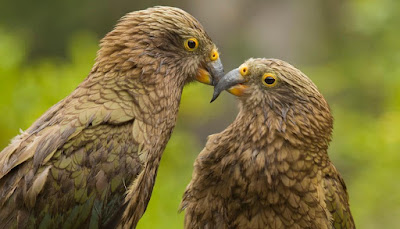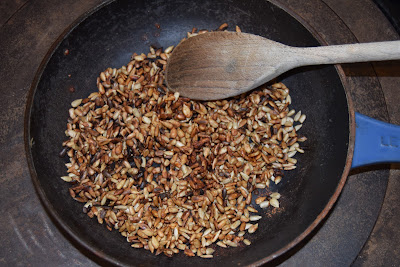56 / Laughter
It’s long been
known that other creatures laugh.
Laughter is not only a human behaviour. A recent study has shown that kea birds, a species of
intelligent and sociable parrot, happily respond to a kea bird’s equivalent
of merry laughter. Researchers in
New Zealand recorded the sounds keas made during solo play with objects around them,
and during social rough and tumbling and aerial acrobatics. The broadcasting of these ‘vocalisations’
induced wild kea, both juvenile and adult, spontaneously to start to play with
other kea nearby. The sound of
‘laughter’ acts as a positive ‘emotional contagion’, rather as it is for us humans. Little children giggling gleefully together. Joining in laughter with the crowd - even if we
don’t know what we're laughing about. Intrepid researchers have also tickled animals from rats to gorillas to confirm that tickling has been found to elicit a laughter
response not only in our species but in other animals, too. (YouTube has some glorious examples. Have
a look. I’d be surprised if you
didn’t feel the tug of some of these apparent ‘expressions of joy’. )
Laughter is vital to our well being. It really is the best medicine. Interestingly for me, studies indicate a significant role for laughter in complementary cancer treatment. Stress is recognised to be a contributory cause of cancer since it weakens the immune system. Hearty laughter counteracts this and boosts endorphins. Laughter therapies, including, for example, yoga laughter developed in India in 1995, are offered at many cancer centres. I haven't yet experienced any of these therapies but they would appear timely. Seems to me the world could do with a bit more laughter.
Laughter is vital to our well being. It really is the best medicine. Interestingly for me, studies indicate a significant role for laughter in complementary cancer treatment. Stress is recognised to be a contributory cause of cancer since it weakens the immune system. Hearty laughter counteracts this and boosts endorphins. Laughter therapies, including, for example, yoga laughter developed in India in 1995, are offered at many cancer centres. I haven't yet experienced any of these therapies but they would appear timely. Seems to me the world could do with a bit more laughter.
 |
| Stock photo: Kea birds |

